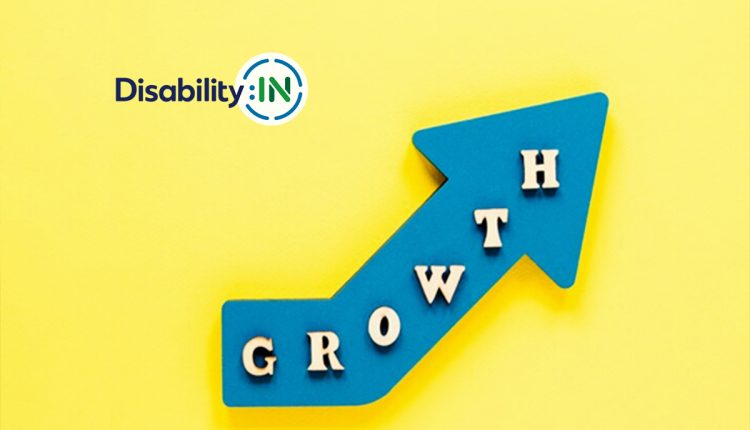The 2024 Disability Equality Index ® Reveals Strong Growth in Leadership and Accessibility but Boardroom Inclusion Lags
-
Benchmarking tool expands internationally ahead of forthcoming European reporting mandates, giving rise to disability inclusion as a sustainability issue
-
45% of respondents are publishing diversity reports that include disability data, up from 24% a year ago
Disability:IN, the global nonprofit organization driving disability inclusion and equality in business, today unveiled the 2024 Disability Equality Index® report at the Disability:IN Global Conference & Expo, revealing higher year-over-year adoption rates for nearly all reported practices around disability inclusion while also showing the need for more progress in areas such as diversity reporting, supplier diversity spending and boardroom inclusion.
A total of 542 U.S. companies participated this year, a growth rate of 7x since the index launched 10 years ago in partnership with AAPD. Among the U.S. companies that have taken the Disability Equality Index, where year-over-year data is currently available, this year’s report shows:
- 45% are publishing diversity reports that include disability data, up from 24% in 2023.
- 71% have a requirement to ensure digital products are accessible and usable by individuals with disabilities, up from 64% in 2023.
- 24% have company-wide disability-focused goals in place for supplier diversity and inclusion.
- 11% of companies report having an openly disabled director on their corporate board; however, just 3% of companies voluntarily report on disability at the board level.
- 8% of companies now include disability in their corporate governance charters that outline the nomination of new directors.
Read More: Key Insights Into The Utility Of AI In The College Application Process
Global pathways to inclusion
For the first time ever, this year Disability:IN opened the benchmarking tool to companies in seven new markets, adding Brazil, Canada, Germany, India, Japan, the Philippines, and the United Kingdom to the scored benchmarks, bringing the global number of submissions to 753.
Though the multimarket sample sizes were small in the inaugural year, the 2024 report shows:
- 91% of Brazil respondents (out of 34 companies) reported offering short-term disability benefits to both full and part-time employees.
- 82% of Canada respondents (out of 34 companies) reported having employment and retention programs focused on or inclusive of people with disabilities.
- 64% of U.K. respondents (out of 56 companies) reported having a centralized fund or budget margin for accommodations.
“Expanding the Disability Equality Index internationally reflects the tremendous demand for enhanced disability inclusion and reporting in multinational markets. We’re giving companies that operate outside of the U.S. a culturally competent tool to fully measure their disability inclusion efforts,” said Jill Houghton, president and CEO, Disability:IN. “The Disability Equality Index now empowers businesses around the world to drive positive change, but we still have more work to do to encourage companies to tap into the potential of the global disability community as consumers, employees and suppliers.”
The internationalization of the Disability Equality Index also coincides with the first major legislative mandate to integrate disability into business accountability standards for assessing businesses’ environmental and social impact. The European Union’s adoption of the Corporate Sustainability Reporting Directive is the first modernization of mandatory sustainability reporting standards to include disability.
In the coming years, the Disability Equality Index will seek to further evolve the benchmark, questions, scoring, methodology and metrics for more broad-based universal use globally. The index will also be poised to help multinational companies expedite the reporting process in their requirements to substantiate their inclusion efforts for all stakeholders.
“We’re excited to mark a decade of progress and a new chapter in disability inclusion for the Disability Equality Index. Disability inclusion is now formally recognized as a global sustainability issue, and as companies begin to substantiate their inclusion efforts for all stakeholders, the Disability Equality Index is a proven tool for companies to measure their efforts and generate sustainable long-term performance,” said Ted Kennedy, Jr., co-chair of the Disability Equality Index and immediate past chair of AAPD.
Actionable insights for companies
Refreshed research from Accenture that uses data from the Disability Equality Index shows that U.S. companies leading on disability inclusion over a five-year period realized marked business gains over other participants, achieving 1.6 times more revenue, 2.6 times more net income, and 2 times more economic profit.
Based on this year’s findings, Disability:IN has identified five measurable actions that companies and individuals can take to continue to work towards sustainable and inclusive performance:
- Encourage employee self-identification: Implement a confidential and voluntary process for employees to self-identify as individuals with disabilities, enabling accurate tracking and improved workforce support. This year, 5% is the median self-identification rate of new hires at companies who are now affirming their disability status during onboarding, according to the report.
- Leverage disability-focused ERGs: Utilize the cross-functional expertise and lived experiences of ERG members to gain valuable insights and enhance inclusion strategies.
- Conduct accessibility audits: Audit for compliance under the World Wide Web Consortium’s Web Content Accessibility Guidelines 2.2 AA to help ensure that digital content is accessible to all users.
- Modernize corporate governance: Revise charters to include prospective directors with disabilities in the definition of board diversity as most already do with gender, race and ethnicity.
- Accelerate spending with Disability-Owned Business Enterprises®: Include disability in supplier diversity/inclusive procurement efforts.
Read More : HRTech Interview With Lavonne Monroe, VP Of Global Talent Acquisition And Onboarding At HPE
[To share your insights with us, please write to psen@itechseries.com ]

